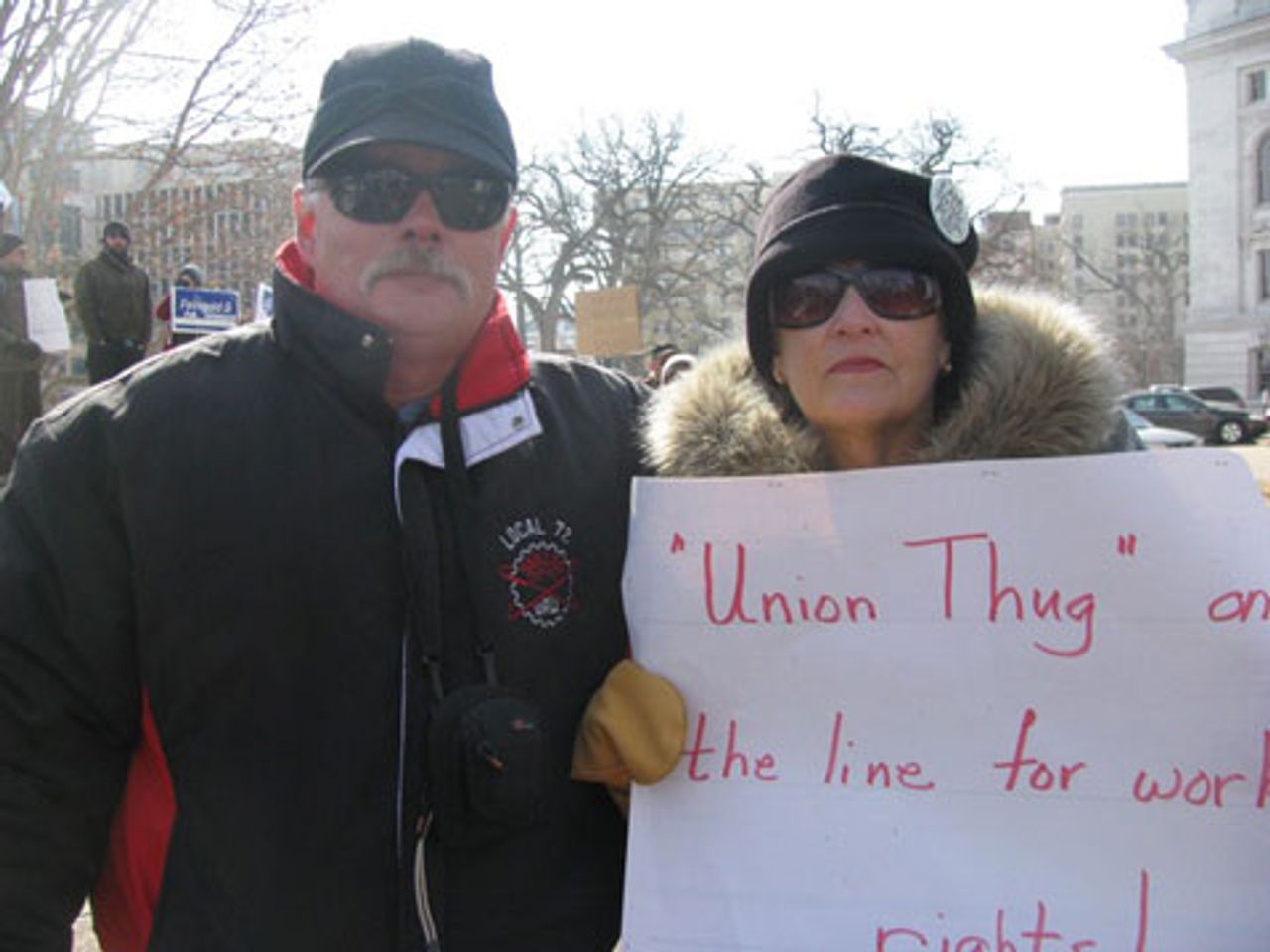Teachers have played a central role in the struggle of Wisconsin workers, conducting mass job actions, which were supported by student walkouts at East High School in Madison and many other schools.
Teachers reacted angrily to Governor Scott Walker’s new budget that will slash nearly a billion dollars from kindergarten through 12th grade education. This will lead to a wave of school closings, the elimination of programs and further wage and benefits concessions. In his address, the governor also called for the expansion of charter schools and other privatization plans.
While this attack has provoked widespread opposition from rank and file teachers and working people throughout the state, officials from the Wisconsin Educational Association Council (WEAC), which bargains for 98,000 teachers statewide, have already accepted the governor’s demands that instructors pay more for their health care and pension benefits—a de facto pay cut of up to 20 percent.
WEAC President Mary Bell has insisted the “issue is not money,” but preserving the legal status of the unions to work with the Republicans and Democrats to “balance the budget.” Last month, Bell negotiated the expansion of test-based merit pay behind the backs of teachers, winning the plaudits of state Republicans.
Teachers want to defend collective bargaining rights in order to defend their living standards and working conditions. In interviews teachers express their determination to fight the devastating budget cuts and the attack on public education.
 Martha Stryker and her husband and child
Martha Stryker and her husband and childMartha Stryker, a Madison public school teacher for five years, said, “This bill strips us of the right to bargain. It could cancel the contracts we already have and our salaries could be cut.
“We love to teach and none of us got in this profession for the money. But we bought a house based on the income I make now with the understanding that it would gradually rise. Who knows whether we are going to be able to make the mortgage now? Then there are teachers who retired after thirty years who have no savings and depend on their pensions. What is going to happen to them?
“These cuts are going to hit the kids, with school closings, consolidations and increases in classroom sizes. The number of students in my school for low-income kids is currently capped at 18 per class. It rose last year—and it’s hard to fathom what is going to happen now. It makes it even more difficult to teach and they want to base a teacher’s pay on test scores. Something needs to be done to improve the schools—but Obama’s Race to the Top and the pushing of merit pay and charter schools isn’t it.
“I grew up in California and charters and privatization in that state are not working. Companies come in and say ‘we can fix education,’ then they walk away and leave the kids behind.
“At lunch we were sitting around talking about what we should do next. We’re all in this together and we spoke about a strike by teachers. We have to fight.”
Her husband added, “The Madison teachers’ contract is up at the end of the year—without any protection they could extend the workday and the number of days you have to teach. They say teachers only work nine months out of the year. But if you calculate all the extra hours they put in, it’s easily forty hours a week, 52 weeks every year. At the current pay rate with all those hours, they are getting about the same as a baby sitter making three dollars an hour.
“My wife teaches on the north side, in an underserved neighborhood. Right now the class sizes are small and manageable, but that could change. A lot of her students are afraid of going home for the weekend—not because of abuse at home but because they have no idea if they are going to have a breakfast, a lunch or an afternoon snack, like they do in school.”
Another Madison teacher said, “Do you want to know what the problem is? The securities and trading firms on Wall Street gave out $135 billion in bonuses and pay. That was up 5.4 percent over 2009. At the same time 46 states have cut essential services for the elderly, the disabled, K-12 schools, higher education and public health because of falling tax revenue.
“A whole sector of society is expected to do without. Meanwhile, Walker and others are silencing democracy. Here in Wisconsin they are working on a voter ID bill that will restrict voters like students and the poor.
“In terms of education, Obama’s Race to the Top has gone even further than Bush’s No Child Left Behind. They are turning teachers in one district against teachers in others in a competition for funding and pushing charter schools, which is the privatization of education.”
A retired public employee who worked at Department of Transportation told the WSWS, “We’re here to defend workers’ rights. If they take teachers’ collective bargaining rights they are going to pay for the $1 billion in cuts by throwing out the older, higher paid teachers. Why pay $45,000 for an older teacher when you can hire someone for $15,000? We have grandchildren in the public schools and they are going to affected.
“Public employees haven’t had a raise in ten years. The former governor [Democrat Jim Doyle] imposed furloughs. My daughter and son-in-law are both public employees. If they have to pay more for health care and pension benefits it will cost them $600 a month. They’re already paying $1,600 for childcare every month. At the same time they are giving tax cuts to the richest two percent in America.”
 Frank and Joan West
Frank and Joan WestJoan and Frank West were also at the demonstration. Joan is a retired teacher from the Racine public schools. “I went on strike for 50 days in 1977 to defend these rights. Walker wants to take them away.” Commenting on the growth of inequality over the last 30 years, she said, “Back in 1980 the compensation of a CEO was about 40 times that of the average worker. Today it is more than 500 times.”
Her husband, Frank, worked in the auto plants for 35 years and lost his job when Chrysler closed its engine plant in Kenosha earlier this year. Workers in the state of Wisconsin have suffered from the destruction of basic industry over the last three decades, as the economy shifted ever more towards financial speculation.
Frank described the loss of jobs in Kenosha, an industrial city south of Milwaukee. “Chrysler shut its car production operations in Kenosha in 1988. But engine production continued until five months ago when they closed the plant. I started working in the plant when I was 18 years old. At that time you could have walked into the American Motors (later Chrysler) plant, Mack White, Jacobson, Webster Electric—where my dad worked—or Case. All of the plants closed and there is nothing left but empty brown fields where they once stood.”
The desperate situation throughout the state was underscored by a jobs fair last weekend in Oshkosh where more than 5,000 workers applied for 750 jobs at a manufacturing plant.
